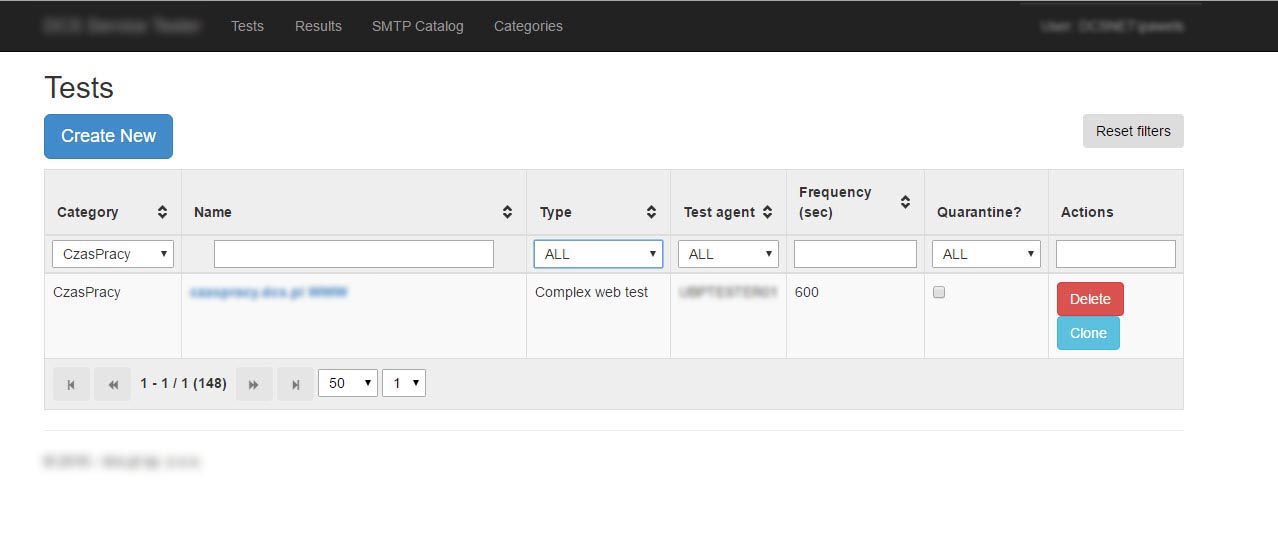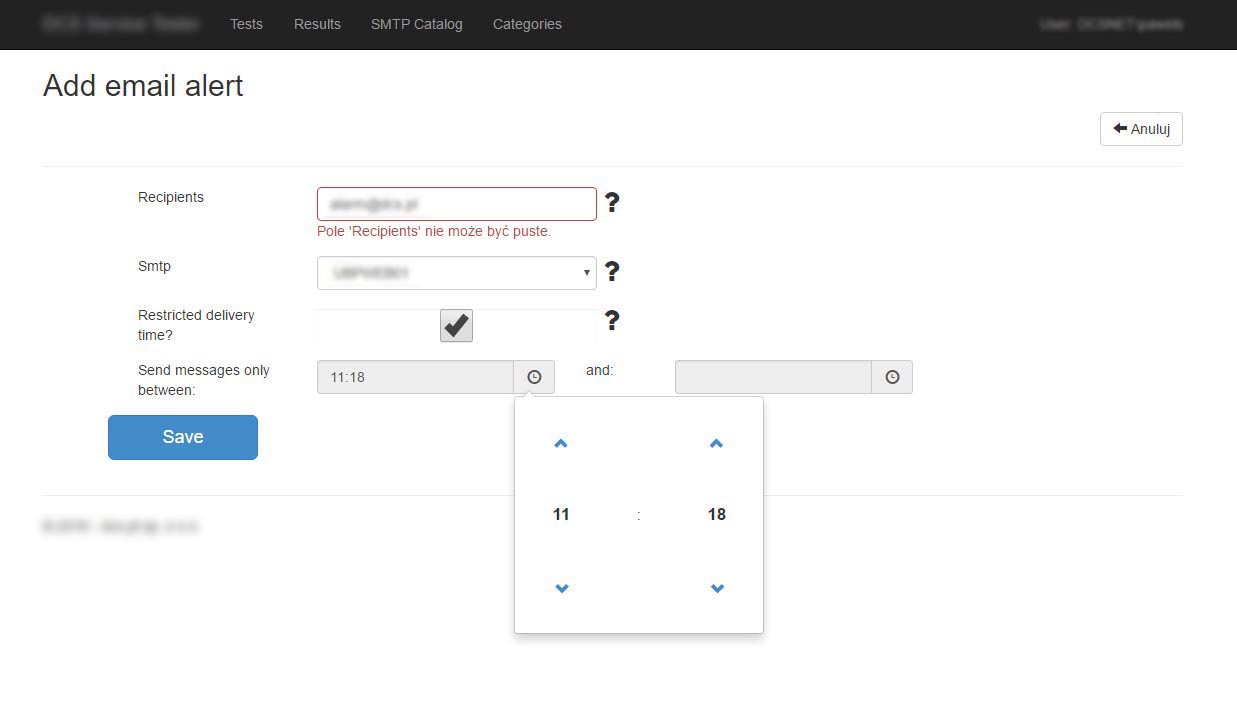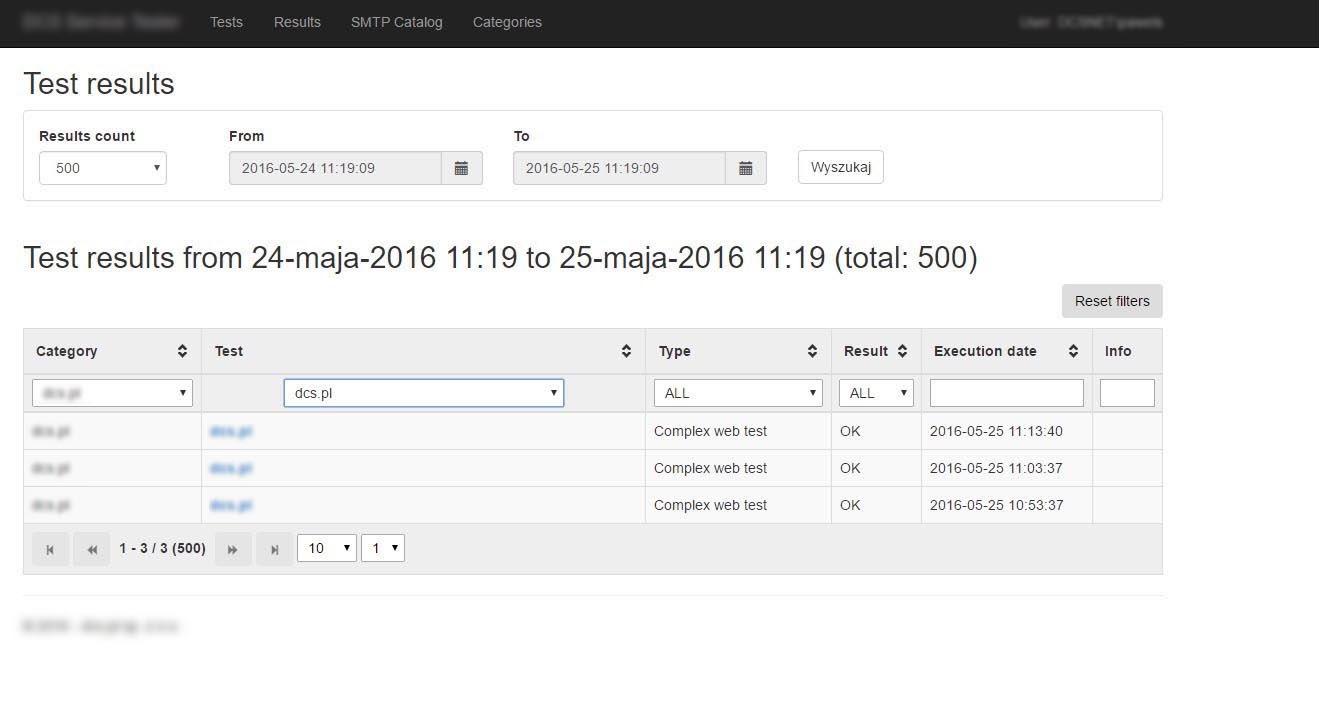ATC – Application Test Console
Application Test Console is a software program enabling real-time monitoring of any application (a service tester), including business applications, using appropriately selected automatic tests. The software is designed to be installed on the customer’s premises.
Using the tests, it is possible to monitor the condition of servers, web applications (web application tests), services, databases and to verify their proper operation. You can collect information from application logs and perform additional actions to verify the correctness of the application's operation. Alerts of any irregularities in the operation of the tested environment can be automatically sent via text messages and e-mail.
The ATC has a central web console that allows you to manage tests and view their results. Tests can be run remotely, controlled by the central console and performed on servers equipped with an agent.
The tool has a rich set of built-in, preconfigured tests. Additionally, the user can add tests by himself, can have them developed by external software developers, can order the configuration of dedicated tests from the solution provider or directly from the manufacturer.
Application description
ATC allows administrators to create and periodically run tests to monitor the correct functioning of any application. It can test various application activities - from simple actions checking the availability of an application (e.g. checking a website, collecting information about errors from an event log, etc.) to complex operations testing the correctness of specific business scenarios (e.g. execution of a specific action on a website, followed by checking the correctness of the result recorded by the application in the database).
The result of a single test can be a logical value (YES or NO) or a numerical value, which can then be compared with the expected value or range of allowed values. An example of such an action may be a test scenario monitoring the average processing time of the order from the moment of its receipt to its completion.
Test results can be sent by e-mail or a text message according to the policy set by the administrator (e.g. any value obtained in the test can be sent: only an error, only a change of status or only a specific value, etc.).
Application structure
ATC Application structure diagram:
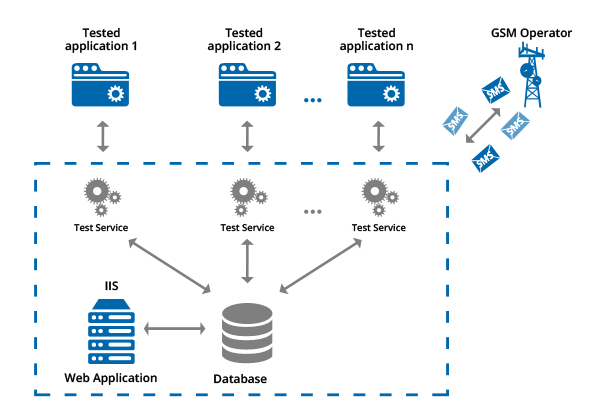
ATC is made up of the following components:
- ATC WebApplication – a web interface to manage and view test results
- ATC Database – a database storing configurations and test results
- ATC Test Service – a service controlling the execution of tests on monitored servers
Basic functions
The list of basic functions of ATC:
- Creation, editing, deleting of tests
- Viewing test results
- Creating, viewing reports presenting test results
- An extensive list of built-in tests, including:
- Availability of servers in the computer network (ping, rpc)
- Operation of services
- Availability of web applications
- Availability of services
- Availability of databases (MS SQL, Mongo, inne)
- Retrieving values from the databases
- Downloading values from the web
- Presence of the template on the website
- Inserting, reading messages from the queue
- Correctness of installed certificates
- User authentication test (different protocols)
- The possibility of adding own tests
- Notifying about the test results via e-mail or a text message
- Availability of the"maintenance mode"
- The possibility of confirming failures
- Software development documentation for creating your own tests
Additional functions
ATC allows you to categorize tests, so you can group and create test classes. In this way, every user can easily see the test portfolio, and read and evaluate the purpose and weight of each test faster.
The administrator receives an ATC notification only when his intervention is required. This is possible thanks to the intelligent notification scenario built into the tool, the failure confirmation mechanism and the maintenance mode.
A great advantage of ATC is the possibility for users to construct their own tests. Each test consists of two parts. The test definition includes a set of parameters characteristic for a given type of a test and metadata used to dynamically generate the form. The course of the test is described by a class defined by the user using a web form designed to return a specific result (test result).
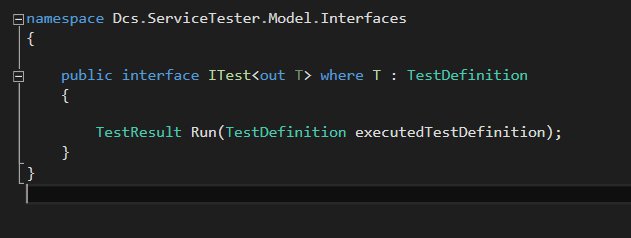
Major benefits
- Prompt detection of application failures, errors and faults
- Systematic increase of confidence in the application and stability of its operation thanks to a quick response of the service team
- Possibility of quick and flexible adaptation of application monitoring to business requirements
- Ensuring continuity of application monitoring thanks to a distributed architecture allowing for testing applications even in case of network communication problems
- Limitation of the number of alarms sent thanks to the possibility of a flexible definition of the notification policy
- Using the best solutions applied by operators to monitor the correctness of services
- An intuitive interface for test configuration and management, and for a wide range of reports
Application screenshots
Below are some examples of ATC screenshots. It is possible to test the application "live" using a demo platform, without having to install the software in the customer's IT infrastructure. If you are interested, please contact us directly at the fillowing e-mail address: info@dcs.pl
Application distribution
Using the ATC application requires the purchase of a licence for all installed agents and active tests. The number of agents and the number of active tests in the customer's IT environment must not exceed the values provided in the purchased licence.
The ATC application is offered as two software packages: the Installation Package and the Additional Package. Each package contains: (1) the Licence and (2) Technical Support. The description and pricing of the packages, the licensing rules, the support rules and optional add-on services are described below.
(1) The Software Licence - a non-exclusive and non-transferable licence of unlimited duration to use the Software, including the right to use the Software (including loading into the computer memory) without the right to modify, copy or make available to third parties, whether for a fee or not. Detailed terms of the Software Licence are available under the "Licence" tab. (above).
(2) Technical support - technical support including assistance by correspondence and telephone for the use of the software. Package prices include support for 1 year. The conditions for extending support are set out in the "Prices for extension of support" section. Detailed conditions of Technical Support are available under "Support". (above).
NOTE: The ATC application can use SMS messages to send test results to mobile phones. This price list does not include the costs associated with sending SMS messages.
Prices
When you purchase an ATC application, you must purchase one Installation Package and the appropriate number of Additional Packages. The price of each package includes one Software Licence for a specified number of agents and tests and Technical Support for 1 year. The terms and conditions for the provision and extension of support are set forth in the "Prices for extention of support".
|
Software packages |
Net price |
Package description |
|---|---|---|
|
ATC - Installation package for 10 agents and 100 tests with technical support for 1 year |
3,600 EUR |
Software licence for up to 10 agents and 100 tests, Technical Support for 1 year. If you have more agents/tests, you must purchase the appropriate number of Additional Packages. |
|
ATC - Additional package for 10 agents and 100 tests with technical support for 1 year |
260 EUR |
Software licence for additional 10 agents and 100 tests, Technical Support for 1 year. The Additional Package can only be purchased as an extension of the Installation Package. |
VAT must be added to the prices in the table.
Prices for extension of support
The price of ATC packages includes Technical Support provided by the producer's service team for 1 year from the date of purchase. Technical Support may be extended in accordance with the table below at any time, but no later than 30 days after expiry. Renewal of support after 30 days from the expiry date shall be subject to an equalisation fee for the delay period and an additional fee of 25% of the support extension price. If support needs to be resumed after 12 months from the expiry date, additional acceptance of the producer is required.
|
Extension of Support |
Net price |
Support description |
|---|---|---|
|
ATC – Extension of Support for the Installation Package for 10 agents and 100 tests for 1 year |
900 EUR |
Technical Support in Polish for the Installation Package for 10 agents and 100 tests for 1 year. |
|
ATC – Extension of Support for the Additional Package for 10 agents and 100 tests for 1 year |
65 EUR |
Technical Support in Polish for the Additional Package for 10 agents and 100 tests for 1 year. Support should be extended for all Additional Packages. |
VAT must be added to the prices in the table.
NOTE: Technical support is provided by the producer's service team remotely with the active participation of the customer's administrator. Prices of support do not include costs related to travel and accommodation of specialists and transport of products and equipment. Where the presence of the producer's specialists at the site of installation is necessary, the terms and the price of such a service require a separate agreement.
Prices of additional options
Additional services can be ordered independently of ATC packages, but their purchase does not have to be correlated with the purchase of DSM packages. However, it is required that the additional services are provided during the period of your Technical Support entitlement. Detailed conditions, scope of services and fees for additional services are determined individually taking into account the rates contained in the table below.
|
Additional options |
Net price |
Service description |
|---|---|---|
|
ATC – Implementation service |
45 EUR / hour |
Implementation of the software on the customer's server on the basis of the individual agreements. Total cost of the service is calculated on the basis of the duration of work. The rate given applies to one hour of work. |
|
ATC – Implementation of additional functionalities |
45 EUR / hour |
The fee and terms of service are determined on the basis of the individual agreements. Total cost of the service is calculated on the basis of the duration of work. The rate given applies to one hour of work. |
VAT must be added to the prices in the table.
NOTE: Services under the additional options can be provided both remotely and at the customer's premises, depending on arrangements. Prices of additional options do not include costs related to travel and accommodation of specialists and transport of products and equipment. All such costs require additional arrangements.
Software Licence (A licence agreement)
- The "Application Test Console" software program (abbreviated as ATC) together with the media belonging to it, printed materials (if any) as well as electronic and printed documentation - hereinafter referred to as "Software" - is owned by dcs.pl Sp. z o.o. (hereinafter referred to as DCS) and is protected by the Copyright Act and international conventions, legislative acts of the European Union and other legal provisions that protect intellectual property. This software is not subject to sale, but only to licensing.
- The User (being both a natural and legal person) accepts that by downloading, copying, installing or in any other way using the Software he concludes this licence agreement (hereinafter the Agreement) with dcs.pl Sp. z o.o. for the use of the Software and agrees to be bound by its provisions. If the User does not accept the Agreement, he is not entitled to download, store, install and use the Software and at the same time is obliged to remove all original copies and copies of the Software in his possession.
- The User has the right to use a demo version of the Software free of charge no longer than 30 days from the date of the first installation. A demo version of the Software may have functional limitations in relation to the full version of the Software.
- If the Software has not been removed after 30 days from the date of its first installation, the User is obliged to purchase licences for an appropriate number of agents and an appropriate number of tests that monitor the operation of the application. Exceeding the licence conditions releases DCS from the obligation to provide technical support for the Software.
- The User has the right to save one copy of the Software on one data storage unit (e.g. a CD, a hard disk) for archiving or data security purposes.
- DCS does not permit reverse engineering, decompilation or disassembly of the Software.
- The Software is licensed as a single entity and you may not substitute, separate or alter any of its individual components for use on more than one server and/or to violate any provisions of this Agreement.
- DCS does not permit the lending, renting or leasing of the Software or the transfer of licences, original copies or otherwise made copies of the Software to third parties.
- Electronic and printed materials supplied with the Software may not be copied.
- DCS reserves all rights to publish, reproduce, process and make changes to the Software.
- DCS shall not be liable for errors that occur during the operation of the Software and the data provided with it. DCS shall also not be liable for the lack of compatibility of the Software with other IT systems and for the lack of functionality covering expectations or goals defined by the User.
- DCS shall not be liable for any damages arising from the use of the Software or the lack of the possibility to use the Software (including, without limitation, damages arising from lost profits, system interruptions, lost data and information and other financial losses), even if you have advised DCS of the possibility of such damages. The liability of DCS arising for any reason whatsoever shall be limited to the amount that you have paid for the acquisition of licence rights to the Software.
- The User shall be liable for damages incurred by DCS as a result of the infringement of its Software copyrights.
- DCS reserves the right to claim pecuniary damages or to take legal action in case of violation of its Software copyrights or the use of the Software in breach of the Agreement.
- The provisions of the Civil Code shall apply to matters not covered by the Agreement.
- Third party companies and product names mentioned in the Software may be registered trademarks of their respective owners.
- Any potential disputes arising from the Agreement shall be resolved by a common court having jurisdiction over the registered office of DCS.
Technical Support (A support agreement)
I. DEFINITIONS
- DCS: dcs.pl sp. z o.o., having a registered office in Warsaw, address: 02-785 Warszawa, ul. Puławska 303, entered into the register of entrepreneurs by the District Court for the Capital City of Warsaw in Warsaw, 13th Commercial Division of the National Court Register under the number 0000144808, Tax Identification Number: 951-206-33-62.
- Software: The ”Application Test Console” software program (further referred to as ATC), for which DCS provides Technical Support. The terms of licensing and use of the Software are set forth in the Software Licence.
- Technical support: The maintenance and user support services offered by DCS, consisting in answering questions asked by Users concerning the operation of the Software, as well as assistance in solving problems with the use of the Software, encountered by Users during the use of the Software.
- User: A person authorized to represent an entrepreneur who has the right to use the Software under a Software License he has purchased.
- Service request: A single event or situation recorded by DCS, related to the User's reported question or problem concerning the operation of the Software, documenting the history of Technical Support for the reported question or problem.
- Terms of support: The terms and conditions laid down herein that specify the principles under which DCS provides Technical Support.
Unless otherwise stated in the Terms of Support, all capitalised terms shall be understood in accordance with the above definitions.
II. RULES AND PROCEDURES FOR THE PROVISION OF SERVICES
- The Terms of Support set out the terms and conditions and the manner in which DCS provides Technical Support for the Software, in accordance with the agreements entered into by DCS in this respect.
- The Technical Support Agreement is concluded for a limited period of time and Technical Support is provided only in relation to the latest version of the Software.
- DCS agrees to provide Technical Support only during the term of the Software Licence and the Technical Support Agreement, provided that you pay the required Software Licence and Technical Support fees.
- DCS is exempt from providing Technical Support if you are found to be in breach of the terms of the Software Licence.
- The Technical Support contract is a contract for diligent action within the limits set out in the Terms of Support, and is not a contract to achieve any result. In particular, DCS does not guarantee that Technical Support will meet Users' requirements or expectations.
- In connection with the limited warranty for the Software as commercial software, DCS does not warrant that as a result of providing Technical Support the operation of the Software will be uninterrupted, error-free or malfunction-free, or that Technical Support will correct all errors and malfunctions in the operation of the Software.
- DCS provides two forms of Technical Support:
- the E-mail Support formula consists in the User communicating with DCS via e-mail to the e-mail address indicated by DCS.
- the Live Support formula consists in communicating with DCS by means of a telephone, an Internet messenger or another communication channel provided by DCS.
- Technical Support under the Live Support formula is available daily from 9am to 5pm, except for public holidays.
- DCS does not provide its own means of communication for contacts with users. The contact between DCS and the Users, both by telephone and by means of electronic communication, takes place using services commonly provided by external network operators. Therefore, DCS does not ensure that access to the means of communication offered will be uninterrupted and is not responsible for interruptions in telephone or electronic communication caused by reasons independent of DCS or reasons that cannot be avoided without incurring significant additional costs. This applies in particular to interruptions and disturbances in the proper functioning of external telecommunications links and equipment and to commonly accepted force majeure circumstances.
III. THE MANNER OF PROVIDING TECHNICAL SUPPORT
- DCS decides on its own on the choice of tools and methods of performing Technical Support depending on its assessment of the reported problem. The User is not entitled to request the performance of Technical Support in the manner or form of the Technical Support of his choice.
- Each question or problem reported by the User, referring to a different issue than the one previously reported, results in the registration of a separate Service Request.
- DCS will make its best efforts, but does not guarantee that contact with you as part of the so-called first response to the Service Request will take place no later than on the next business day after the day on which the Service Request was registered. However, this does not mean that the reported question or problem will be definitively resolved within this period.
- The Service Request is closed after the User receives an answer to the submitted question, the problem is solved or the inability to solve the problem is established and the User is informed about it. A Closed Service Request may be reopened in the event that the DCS needs to take further action regarding the Service Request in question.
- DCS shall not apply restrictions on the number of Service Requests opened by the User.

